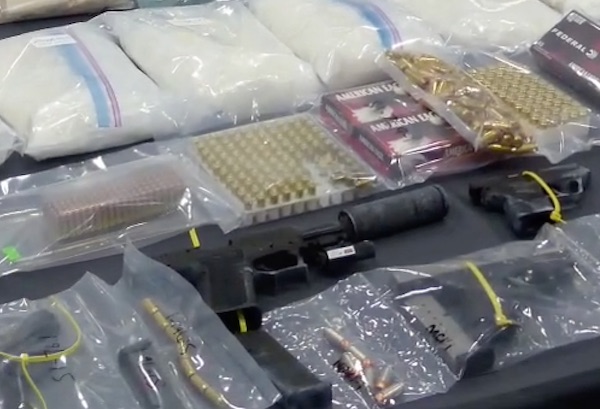Alberta
Handguns and drugs seized in million-dollar bust

News Release from ALERT (Alberta Law Enforcement Response Team)
One million dollars’ worth of drugs was seized, along with multiple firearms, in an ALERT investigation that spread across northern Alberta.
On November 2, 2021 ALERT Edmonton’s organized crime and gang team executed multiple search warrants in effort to disrupt an intraprovincial drug trafficking network. Three homes in Edmonton were searched and targeted vehicle stops were conducted in Red Deer and Whitecourt.
“ALERT’s investigation revealed the Edmonton-based group was aggressive in supplying smaller cells in Grande Prairie and Red Deer. By leveraging our criminal intelligence, and coordinating ALERT’s resources, we were able to undermine their operations by intercepting significant shipments of harmful drugs,” said Inspector Kevin Berge, ALERT Edmonton.
The totality of ALERT’s enforcement efforts netted one million dollars’ worth of drugs, including the seizure of:
- Three handguns;
- 645 rounds of ammunition;
- 8,578 grams of meth;
- 1,317 grams of fentanyl;
- 2,850 milliliters of GHB;
- 3 grams of cocaine;
- 57 opioid pills;
- 17,260 grams of buffing agents;
- 929 grams of unknown powders; and
- $16,255 cash.
All three of the firearms were found with ammunition and not lawfully possessed. One of the firearms was believed to have been 3-D printed and was equipped with a suppression device. ALERT will be submitting the firearms for further analysis and ballistics testing.
Five people were arrested but no charges have been laid at this time.
Members of the public who suspect drug or gang activity in their community can call local police, or contact Crime Stoppers at 1-800-222-TIPS (8477). Crime Stoppers is always anonymous.
ALERT was established and is funded by the Alberta Government and is a compilation of the province’s most sophisticated law enforcement resources committed to tackling serious and organized crime.
Alberta
Alberta’s embrace of activity-based funding is great news for patients

 From the Montreal Economic Institute
From the Montreal Economic Institute
Alberta’s move to fund acute care services through activity-based funding follows best practices internationally, points out an MEI researcher following an announcement made by Premier Danielle Smith earlier today.
“For too long, the way hospitals were funded in Alberta incentivized treating fewer patients, contributing to our long wait times,” explains Krystle Wittevrongel, director of research at the MEI. “International experience has shown that, with the proper funding models in place, health systems become more efficient to the benefit of patients.”
Currently, Alberta’s hospitals are financed under a system called “global budgeting.” This involves allocating a pre-set amount of funding to pay for a specific number of services based on previous years’ budgets.
Under the government’s newly proposed funding system, hospitals receive a fixed payment for each treatment delivered.
An Economic Note published by the MEI last year showed that Quebec’s gradual adoption of activity-based funding led to higher productivity and lower costs in the province’s health system.
Notably, the province observed that the per-procedure cost of MRIs fell by four per cent as the number of procedures performed increased by 22 per cent.
In the radiology and oncology sector, it observed productivity increases of 26 per cent while procedure costs decreased by seven per cent.
“Being able to perform more surgeries, at lower costs, and within shorter timelines is exactly what Alberta’s patients need, and Premier Smith understands that,” continued Mrs. Wittevrongel. “Today’s announcement is a good first step, and we look forward to seeing a successful roll-out once appropriate funding levels per procedure are set.”
The governments expects to roll-out this new funding model for select procedures starting in 2026.
* * *
The MEI is an independent public policy think tank with offices in Montreal, Ottawa, and Calgary. Through its publications, media appearances, and advisory services to policymakers, the MEI stimulates public policy debate and reforms based on sound economics and entrepreneurship.
Alberta
Medical regulator stops short of revoking license of Alberta doctor skeptic of COVID vaccine

From LifeSiteNews
The Democracy Fund has announced that COVID-skeptic Dr. Roger Hodkinson will retain his medical license after a successful appeal against allegations of ‘unprofessional conduct’ by the College of Physicians and Surgeons of Alberta.
A doctor who called for officials to be jailed for being complicit in the “big kill” caused by COVID measures will get to keep his medical license thanks to a ruling by a Canadian medical regulator.
The Democracy Fund (TDF) announced in an April 4 press release that one of its clients, Dr. Roger Hodkinson, will retain his medical license after filing an appeal with the College of Physicians and Surgeons of Alberta (CPSA) over allegations of “unprofessional conduct regarding 17 public statements made in November 2020 and April 2021.”
Hodkinson had routinely argued against the dictates of public health and elected officials and “presented an alternative perspective on COVID-19, including the efficacy of masking and vaccines,” TDF noted.
In 2021, Hodkinson and Dr. Dennis Modry publicly blasted the then-provincial government of Alberta under Premier Jason Kenney for “intimidating” people “into compliance” with COVID-19 lockdowns.
In 2022, Hodkinson said that leaders in Canada and throughout the world have perpetrated the “biggest kill ever in medicine’s history” by coercing people into taking the experimental COVID injections and subjecting them to lengthy lockdowns.
These statements, among others, led the CPSA to claim that Hodkinson had promoted inaccurate or misleading information. “However, following negotiations with lawyers for The Democracy Fund, the CPSA limited its claims to arguing that Dr. Hodkinson’s comments violated the ethical code and extended beyond the scope of a general pathologist.”
Thus, Hodkinson did not “concede that any of his statements were false,” but “acknowledged that his criticisms of other physicians technically breached the Code of Ethics and Professionalism,” the group explained. “He also admitted that he should have clarified that his views were outside the scope of a general pathologist.”
Instead of having his license revoked, TDF stated that Dr. Hodkinson received a “caution” and will have to “complete an online course on influence and advocacy.”
“However, he did not concede that any of his statements were misinformation, nor did the tribunal make such a determination,” noted lawyer Alan Honner.
While Hodkinson received a slap on the wrist, a number of Canadian doctors have faced much harsher sanctions for warning about the experimental vaccines or other COVID protocols such as lockdowns, including the revocation of their medical licenses, as was the case with Dr. Mark Trozzi and others.
Some of Hodkinson’s warnings seem to have been vindicated by the current Alberta government under Premier Danielle Smith, who commissioned Dr. Gary Davidson to investigate the previous administration’s handling of COVID-19.
Davidson’s report, which was made public earlier this year, recommended the immediately halt of the experimental jabs for healthy children and teenagers, citing the risks the shots pose.
-

 2025 Federal Election2 days ago
2025 Federal Election2 days agoMark Carney Comes to B.C. and Delivers a Masterclass in Liberal Arrogance
-

 2025 Federal Election2 days ago
2025 Federal Election2 days agoPoilievre to invest in recovery, cut off federal funding for opioids and defund drug dens
-

 Business2 days ago
Business2 days agoTrump threatens additional 50% tariffs on China, urges ‘patience’
-

 Alberta2 days ago
Alberta2 days agoProvince introducing “Patient-Focused Funding Model” to fund acute care in Alberta
-

 Alberta2 days ago
Alberta2 days agoMedical regulator stops short of revoking license of Alberta doctor skeptic of COVID vaccine
-

 MacDonald Laurier Institute2 days ago
MacDonald Laurier Institute2 days agoRushing to death in Canada’s MAiD regime
-

 International2 days ago
International2 days agoUN committee urges Canada to repeal euthanasia for non-terminally ill patients
-

 Energy2 days ago
Energy2 days agoEnergy group urges Trump administration to restock oil reserves









